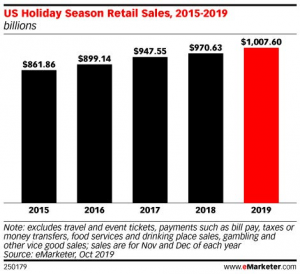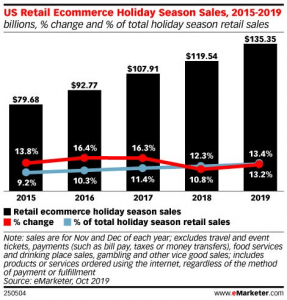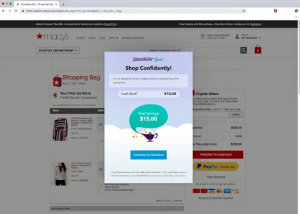Coupon Browser Extensions: Sweet Deals For A Not So Sweet Price?
By Keane Johnson | December 6, 2019
With Thanksgiving come and gone, the holiday season is in full swing, meaning most Americans are turning their attention to holiday shopping. This year is predicted to be another record-breaking season, with total consumer sales forecasted to grow 3.8% over 2018 and exceed $1 trillion for the first time in history [1].

Although brick-and-mortar stores continue to account for the vast majority of consumer spending, online sales are forecasted to increase 13.2% to $135.5 billion, or 13.4% of total holiday shopping [1].

This growth is not limited to the holiday season. Online shopping in the United States has grown from 7.1% of total sales in 2015 to 8.9% of total sales in 2018 [2]. This increase in online shopping has motivated the creation of multiple sites and plugins that deliver discount codes or coupons to consumers. These plugins automatically process what is in a consumer’s online shopping cart, search the internet for available codes or coupons, and apply the best one at checkout.
One of the pioneers in this space is RetailMeNot. The original RetailMeNot service aggregated coupon and discount codes for a wide variety of companies on its website. Consumers would then go to the site, copy the coupon code, and apply the code to their carts at checkout. In 2018, RetailMeNot observed over 453 million site visits and facilitated global sales of $4.9 billion [3].
Two years ago, RetailMeNot released a browser extension – RetailMeNot Genie – that applies discounts and cash-back offers directly to a consumer’s cart at checkout. The plug-in is 100% free, meaning that those savings come at no monetary cost to the consumer.

However, as the saying goes, if you are not buying the product, you are the product. An examination of RetailMeNot’s Privacy Policy and their use of customer data raises some serious ethical concerns. RetailMeNot collects, either online or through a mobile device, consumer’s contact information (email, phone number, and address), “relationship information” (lifestyle, preferences, and interests), “transaction information” (kinds of coupons that are redeemed), location information (consumer’s proximity to a merchant), and “analytics information” (information about a user’s mobile device, including applications used, web pages browsed, battery level, and more).
RetailMeNot uses this information for a variety of purposes, including: creating user profiles that may infer age range, income range, gender, and interests; inferring the location of places users visit often; providing notifications when users arrive at, linger near, or leave these places; and providing advertisements through display, email, text, and mobile-push notifications [4]. Additionally, RetailMeNot may allow third parties to track and collect this data for their own purposes [4].
RetailMeNot may also share personal information “to effect a merger, acquisition, or otherwise; to support the sale or transfer of business assets” [4]. This final clause is the most troubling because it gives RetailMeNot leeway to sell its users’ personal information to support its business. And so although there is no upfront monetary cost to using RetailMeNot, users could end up paying in the background with their personal data.

However, alternative deal-hunting services are becoming more and more available. One of the fastest-growing is Honey, which like RetailMeNot’s Genie, is a browser extension that automatically applies coupon codes and discounts. Honey is transparent about the type of data they collect and is upfront about never selling their users’ personal information [5]. However, they may share data “with a buyer or successor if Honey is involved in a merger, acquisition, or similar corporate transaction” [5]. Their recent acquisition by Paypal [6] may mean that their users’ personal information is now in the hands of one of the largest online payments systems in the world. And Honey may no longer have control over how this information is used.
In summary, free deal-hunting and coupon-finding extensions are becoming more popular because they offer consumers an opportunity to easily save money. But this free money may be too good to be true. An inspection of the privacy policies of a couple popular services shows that consumers may end up paying with their sensitive personal information.
Content References
[1] https://www.businessinsider.com/emarketer-2019-holiday-shopping-forecast-2019-11
[2] https://www.invespcro.com/blog/global-online-retail-spending-statistics-and-trends/
[3] https://www.retailmenot.com/corp/about/
[4] https://www.retailmenot.com/static/privacy/
[5] https://www.joinhoney.com/privacy
[6] https://techcrunch.com/2019/11/20/paypal-to-acquire-shopping-and-rewards-platform-honey-for-4-billion/
Image References
[1] https://www.businessinsider.com/emarketer-2019-holiday-shopping-forecast-2019-11
[2] https://www.businessinsider.com/emarketer-2019-holiday-shopping-forecast-2019-11
[3] https://www.popsugar.com/smart-living/How-Does-RetailMeNot-Work-45478112
[4] [https://www.joinhoney.com](https://www.joinhoney.com/)
